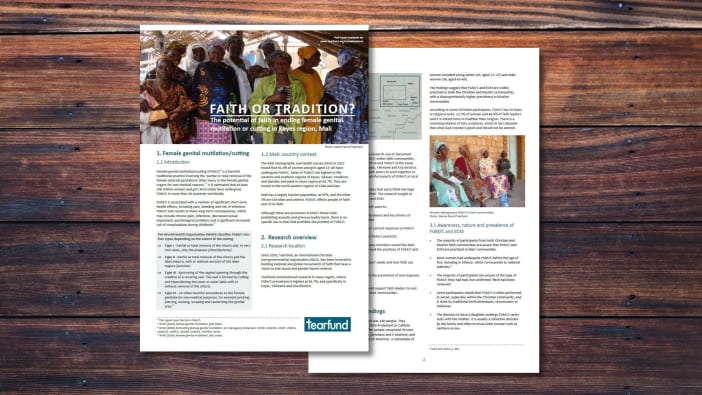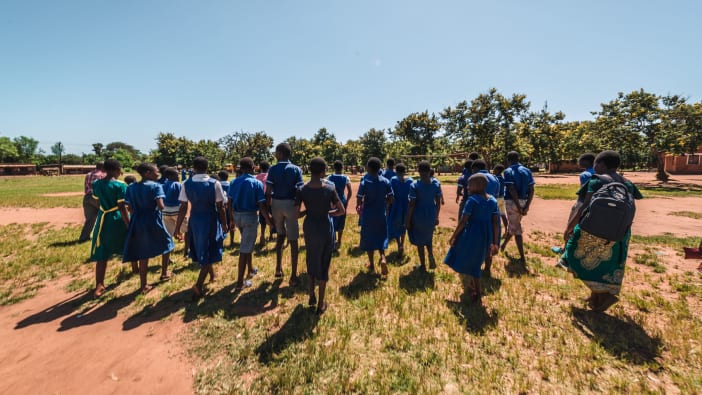by Dr Halimatou Bourdanne.
Excision is a common ritual practice in certain African countries, especially the Ivory Coast where I live. It is carried out by certain ethnic groups. It consists of removing a greater or lesser part of the lips (the fleshy folds of skin around the vagina) and clitoris of women and young girls. The clitoris corresponds to the man’s penis.
There are four kinds of excision:
First degree – removing the top of the clitoris (this is similar to male circumcision).
Second degree – total removal of the clitoris, and part of the small lips.
Third degree – total removal of the clitoris, the small and the large lips.
Fourth degree or infibulation – this consists of sewing together the two edges of the vulva after removing the clitoris, the small and large lips. A small hole is left to allow menstruation.
From the second degree onwards, one is talking of mutilation. Huge health problems can result from excision – especially during childbirth.
The age of excision varies depending on the ethnic group. It can be as early as seven days old or as late as when giving birth for the first time. Generally, older women take responsibility for this ritual. They use sharp objects such as knives, razor blades or certain plants.
The reasons for excision
There are many reasons given. However the essential aim is to keep the woman in submission to the man. Excision prevents women from enjoying sex to the full, so women have a sexual life of complete resignation. They are more docile because they feel less pleasure. Some people say that non-excised women cannot conceive.
In the case of infibulation, it is to guarantee the woman’s faithfulness. In fact, each time the husband goes on a journey he carries out infibulation, and on his return he ‘tears apart’ the stitches.
The complications
Immediate…
- severe bleeding, sometimes resulting in death
- damage to neighbouring organs such as the urethra or the rectum
- infection through lack of hygiene, the most serious being tetanus.
Later…
- severe pain during sexual intercourse
- sexual problems because the woman feels neither desire nor pleasure
- repeated vaginal infections
- fistulas.
Risks during childbirth
With excised women, we are often forced to make large cuts (episiotomies) during childbirth because the opening of the vagina is so reduced in size. We then risk damaging the rectum or the urethra.
One particularly tragic case affected me during my work. One day a young woman arrived, 18 years old and in the first stage of labour. It was her first pregnancy. On examining her, we found that she had a second degree excision. We felt that normal birth should be possible since the baby was small in size. However, when the labour took much longer than normal we realised there was a problem. Since there was no progress, we decided there was a need for a caesarean section. Unfortunately, while waiting for the operating equipment (which has to be paid for) the baby died.
Excision had made the skin so narrow and rigid that childbirth was impossible. In removing the dead baby, the mother’s vagina was completely ruined and we had to sew her up. In the days following childbirth, the mother had losses of urine that made us fear the later appearance of a fistula.
Our response
How should we react when faced with this practice? Excision is an important problem and a much deeper one than is believed. Anyone attacking this problem is confronted with several obstacles – the silence of the women concerned being the major one.
Excision represents a taboo subject, like anything related to sexuality. It is very rare for a woman to consult a doctor about a problem linked to her excision. It is the intellectual Moslem women who have begun to lift the veil on this practice.
Another problem we find is that uneducated women do not always agree that excision should be banned. In fact, they often want their daughters to be excised. They are convinced that this act is beneficial, in spite of the dangers they risk.
A third problem is our own ignorance about the ethnic groups concerned. Any effective action must be carried out with great sensitivity. This means long and difficult work in understanding their beliefs.
As Christians, we can make our sisters aware of the effects and health risks linked to this practice. We know that sexuality for the Christian couple is a gift of God for their delight. With our non-believing sisters, we can only raise these issues later when we have gained their confidence.
If the number of educated women increases, it is certain that this practice will go into decline.
The struggle to be waged against excision is certainly a long-term one, but it is worth it. It is only then that certain women will know the happiness of married intimacy and be free of the risks to their own and their babies’ health.
Notes for discussion…
- Some of our readers might perhaps say to themselves, ‘I really do not understand at all how this pressure can push a girl to ask for excision.’ But in Africa, group pressure is very strong – the ‘group’ is more important than the individual. In a case like that of Howa, she wants to do something that the group has not accepted and the group will do everything it can to force her to conform.
What kind of influences may alter group beliefs in the case of vital issues such as excision? - Excision is often taken as proof that a woman is brave. It may be thought of as a question of pride. Women do not wish to be known as weaklings. They want people’s respect. Insults and other pressures can push a girl to have an excision.
How can women like Howa be supported through this kind of continual pressure? - Old people claim that after excision a girl becomes docile and will stay faithful to her husband.
What kind of answers can we give in reply to this claim? - The old women who carry out excisions think they are modern because they have replaced the traditional knife and now use a new blade for each operation.
These old women are often vital in maintaining customs such as excision. Can you think of helpful ways in which they could be encouraged to look at other points of view? - Some say that men encourage excision as a means of exercising power and control over women.
What can men do to encourage discussion of these issues?
Dr Halimatou Bourdanne is a medical doctor. Her address is 22 BP, Abidjan 22, Ivory Coast, W Africa.
Notes for discussion
- Some of our readers might perhaps say to themselves, ‘I really do not understand at all how this pressure can push a girl to ask for excision.’ But in Africa, group pressure is very strong – the ‘group’ is more important than the individual. In a case like that of Howa, she wants to do something that the group has not accepted and the group will do everything it can to force her to conform. What kind of influences may alter group beliefs in the case of vital issues such as excision?
- Excision is often taken as proof that a woman is brave. It may be thought of as a question of pride. Women do not wish to be known as weaklings. They want people’s respect. Insults and other pressures can push a girl to have an excision. How can women like Howa be supported through this kind of continual pressure?
- Old people claim that after excision a girl becomes docile and will stay faithful to her husband. What kind of answers can we give in reply to this claim?
- The old women who carry out excisions think they are modern because they have replaced the traditional knife and now use a new blade for each operation. These old women are often vital in maintaining customs such as excision. Can you think of helpful ways in which they could be encouraged to look at other points of view?
- Some say that men encourage excision as a means of exercising power and control over women. What can men do to encourage discussion of these issues?








